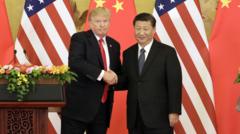The intricate link between U.S. barbecues and international beef trade is becoming increasingly crucial as tariffs influence prices and supply sources.
# The Trade War's Impact: Barbecue Costs on the Rise

# The Trade War's Impact: Barbecue Costs on the Rise
As tariffs shift the beef trade landscape, American barbecue lovers may face higher prices.
American citizens have enjoyed backyard barbecues filled with juicy hamburgers, often made from a blend of locally sourced and imported beef, with Brazilian imports being a key player. Recently, trade tensions and tariffs, particularly those instigated by past presidential policies, threaten to alter this dynamic significantly. This situation arises as U.S. retailers prepare for escalating beef costs, while Brazil seeks to capitalize on its growing opportunity to export beef to China, a significant consumer market for meat.
Due to tariffs imposed during recent trade wars, sourcing Brazilian beef has become more expensive for U.S. consumers. The trade friction has forced China to pivot towards Brazil for beef imports, offering Brazilian producers an unexpected boost in exports. Recent trade data shows American meatpackers have been buying Brazilian beef in anticipation of cost increases, driving up its availability and subsequently altering the U.S. market.
As the summer barbecue season approaches, American beef prices may reflect the ripple effects of international trade, reshaping how and what is served at cookouts across the country. The scenario presents a challenging landscape for both consumers and the beef industry, highlighting the interconnectedness of global markets in shaping everyday life in America.
What remains to be seen is how these changes will ultimately impact consumer choices and barbecue traditions in American society as trade wars continue to unfold. The battle over tariffs has set the stage for a potential rise in prices and a shift in where meat on American tables comes from, likely sparking conversations among grilling enthusiasts throughout the nation.
Due to tariffs imposed during recent trade wars, sourcing Brazilian beef has become more expensive for U.S. consumers. The trade friction has forced China to pivot towards Brazil for beef imports, offering Brazilian producers an unexpected boost in exports. Recent trade data shows American meatpackers have been buying Brazilian beef in anticipation of cost increases, driving up its availability and subsequently altering the U.S. market.
As the summer barbecue season approaches, American beef prices may reflect the ripple effects of international trade, reshaping how and what is served at cookouts across the country. The scenario presents a challenging landscape for both consumers and the beef industry, highlighting the interconnectedness of global markets in shaping everyday life in America.
What remains to be seen is how these changes will ultimately impact consumer choices and barbecue traditions in American society as trade wars continue to unfold. The battle over tariffs has set the stage for a potential rise in prices and a shift in where meat on American tables comes from, likely sparking conversations among grilling enthusiasts throughout the nation.




















